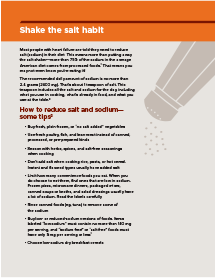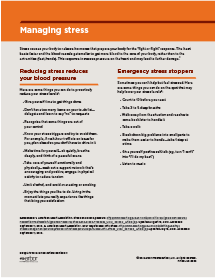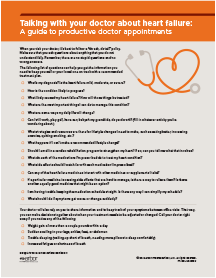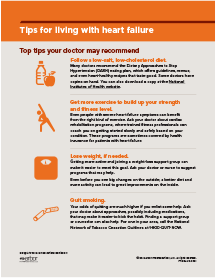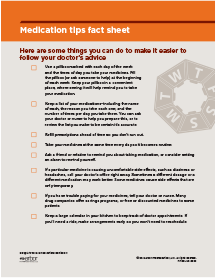Welcome to the Physician Resource Center
Our library of helpful links and patient education resources is designed to provide you with valuable information for use in your practice.
The Minnesota Living with Heart Failure questionnaire is a validated, reliable measure of how HF affects patients' lives using an 0 to 5 QoL scale.
The FDA has determined that BiDil currently has no generic bioequivalent. Moreover, available generics are not indicated to treat HF.
See the full study published in the New England Journal of Medicine.
Resources for patients with heart failure, and caregivers
Explore information and resources designed to help patients and caregivers manage the challenges of heart failure.
See Renil's Heart Failure Story
BiDil – the only heart failure medication designed specifically for self-identified African Americans.
Learn about Renil, a 48-year-old nurse with 5 children, who was recently diagnosed with heart failure (HF). Renil’s physician choose BiDil® (isosorbide dinitrate/hydralazine HCl) as part of an overall treatment plan including routine HF medications.
 View Transcript
View TranscriptIMPORTANT SAFETY INFORMATION
Most common adverse reactions (>5% more on BiDil than on placebo) were headache and dizziness.
Please click here to see full Important Safety Information for BiDil.Renil’s Heart Failure Story
Helpful links
List of links to organizations and research/clinical trials.
By clicking on a link, you will be leaving the BiDil.com website. We make no representations whatsoever about any other website that you may access through this one.
- American Diabetes Association. This website contains information on diabetes prevention, treatment, research, nutrition and diet advice, and more
- American Heart Association. This website offers in-depth information on heart failure as well as tips for caregivers, guidance on end-of-life issues, personal stories, and even heart-healthy recipes
- Association of Black Cardiologists. This professional organization of African American heart specialists offers occasional news updates on research related to heart diseases in the African American community and recommended books on heart health
- The Cleveland Clinic Heart Center and the Mayo Clinic. These top-notch hospitals for heart care each offer websites with searchable databases on all sorts of heart health topics, as well as research updates and news information
- Heart Failure Society of America. This organization of healthcare professionals and researchers also offers a useful patient and caregiver "brochure" about heart failure. You can also order patient education materials by calling (301) 312-8635
- National Black Nurses Association. This professional organization's website offers programs for African American nursing professionals as well as information for the public about heart-related screenings, counseling services, and preventive education classes it offers at its 17 chapter locations
- National Heart, Lung, and Blood Institute. This US government website offers an excellent overview of heart failure, its causes, and its treatments. It also offers an in-depth guide to lowering blood pressure, including information on heart-healthy exercise and the DASH eating plan
- National Medical Association (NMA). This professional organization of African American physicians focuses on promoting equality in healthcare. The site offers information about health policies that the group supports and materials to encourage African American health professionals and patients to more actively participate in clinical research studies. The site includes a physician locator feature to help you find a doctor in your area who's an NMA member
- National Network of Tobacco Cessation Quitlines (1-800-QUIT-NOW). This phone network—recently established by the US Department of Health and Human Services—connects callers with counselors who can offer free guidance and support for quitting smoking. Callers are routed either to their state quitline services or, in states where these are not yet available, to telephone counselors at the National Cancer Institute's Cancer Information Service
- US Department of Health and Human Services, Office of Minority Health. This website offers links to publications, statistics, fact sheets, and resources on all sorts of minority health issues
- ClinicalTrials.gov. This website, sponsored by the National Institutes of Health, lists details about government-supported and privately supported clinical trials covering various health matters, including heart failure. It also includes easy-to-understand details about how clinical trials are conducted and what questions you should ask if you're considering enrolling
- CenterWatch. This website offers information on industry-supported clinical trials covering various health matters, including heart failure. You can also use the site to search for studies being conducted in your area and to sign up for e-mail notifications of new trials that are starting
BiDil has no therapeutic bioequivalent Learn why individual components may not be the answer.
INDICATIONS AND USAGE
BiDil is indicated for the treatment of heart failure as an adjunct to standard therapy in self-identified black patients to improve survival, to prolong time to hospitalization for heart failure, and to improve patient-reported functional status. There is little experience in patients with NYHA class IV heart failure. Most patients in the clinical trial supporting effectiveness (A-HeFT) received a loop diuretic, an angiotensin converting enzyme inhibitor or an angiotensin II receptor blocker, and a beta blocker, and many also received a cardiac glycoside or an aldosterone antagonist.
IMPORTANT SAFETY INFORMATION
BiDil is contraindicated in patients who are allergic to organic nitrates, or who take phosphodiesterase type 5 (PDE5) inhibitors, such as avanafil, sildenafil, tadalafil, or vardenafil, or soluble guanylate cyclase (sGC) stimulator (riociguat). Concomitant use can cause hypotension.
WARNINGS AND PRECAUTIONS
Hydralazine hydrochloride has been reported to cause a drug-induced systemic lupus erythematosus (SLE) syndrome. Symptoms and signs usually regress when hydralazine hydrochloride is discontinued.
Symptomatic hypotension, particularly with upright posture, may occur with even small doses of BiDil. Hypotension is most likely to occur in patients who have been volume or salt depleted; correct prior to initiation of BiDil. Hydralazine hydrochloride can cause tachycardia and hypotension potentially leading to myocardial ischemia and angina, particularly in patients with hypertrophic cardiomyopathy.
Hydralazine hydrochloride has been associated with peripheral neuritis, evidenced by paresthesia, numbness, and tingling, which may be related to an antipyridoxine effect. Pyridoxine should be added to BiDil therapy if such symptoms develop.
ADVERSE REACTIONS
Most common adverse reactions (> 5% more on BiDil than on placebo) were headache and dizziness.
The full Prescribing Information for BiDil is available here.



